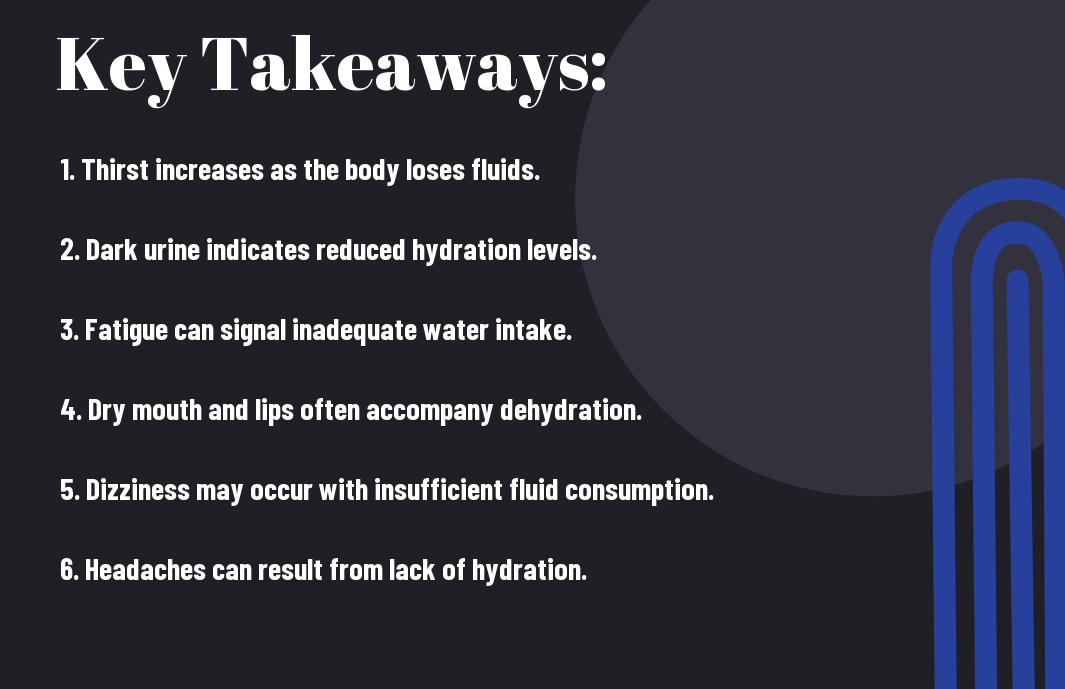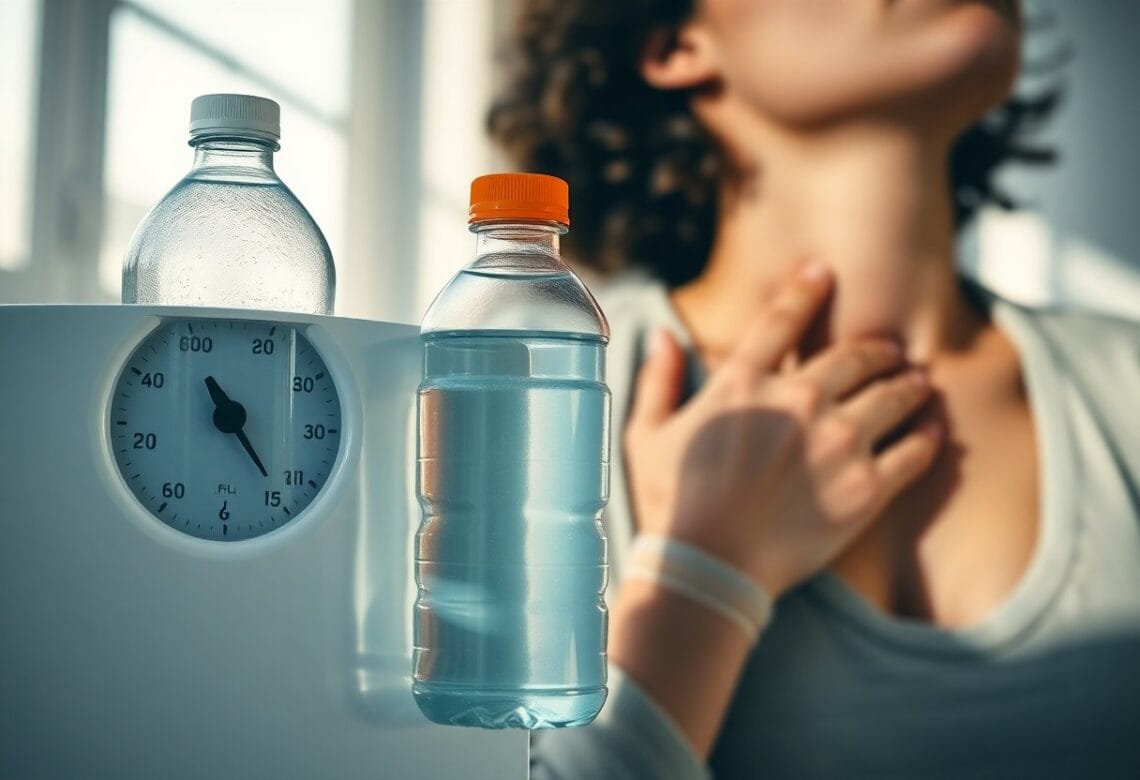Weight loss often comes with the assumption that you must reduce your food intake, but it’s vital to ensure that you’re also paying attention to your hydration levels. As you commence on your weight loss journey, you may overlook the signs of dehydration, which can impede your progress and affect your overall health. In this post, you will learn how to recognize the key indicators of dehydration, enabling you to stay on track and support your well-being as you lose weight.

Key Takeaways:
- Thirst: A common signal your body is dehydrated; staying hydrated can help maintain proper function during weight loss.
- Dark Urine: The color of your urine can indicate dehydration; darker urine typically signifies a lack of sufficient fluids.
- Fatigue: Feeling unusually tired or lethargic may be a sign of dehydration, affecting your weight loss efforts.
- Dizziness: If you experience lightheadedness or dizziness, it could be linked to inadequate hydration levels.
- Dry Skin: Insufficient hydration can lead to dryness; skin elasticity is often compromised during dehydration.
- Headaches: Frequent headaches can result from dehydration; drinking enough water may help alleviate this symptom.
- Cramps: Muscle cramps, particularly during physical activity, can be a warning sign of dehydration affecting your fitness routine.
Understanding Dehydration
The body relies on adequate hydration to function optimally, especially during weight loss. Dehydration occurs when your body loses more fluids than it takes in, leading to numerous health consequences. As you shed pounds, maintaining proper fluid balance becomes necessary, as even mild dehydration can impact your energy levels, metabolism, and overall well-being.
Definition of Dehydration
Understanding dehydration means recognizing it as a state where your body lacks sufficient water to carry out normal physiological processes. This imbalance can result from inadequate fluid intake, excessive sweating, or loss of body fluids through other means, such as illness. Signs of dehydration may range from thirst and dry mouth to fatigue and dizziness.
Importance of Hydration During Weight Loss
About hydration during weight loss, it plays a pivotal role in supporting your metabolic functions and energy levels. Staying hydrated helps your body efficiently burn fat, maintain muscle mass, and regulate your appetite. Additionally, proper hydration can reduce the risks of complications that may arise from rapid weight loss.
Due to the impact of hydration on your body’s ability to function properly, neglecting your fluid intake can hinder your weight loss efforts. When you are dehydrated, your body may misinterpret signals and trigger feelings of hunger, leading to unnecessary snacking or overeating. Furthermore, sufficient hydration can help prevent fatigue, keeping you motivated and active throughout your weight loss journey.


Common Signs of Dehydration
It is vital to recognize the early signs of dehydration, especially during weight loss efforts. Some of the most common symptoms include thirst, dry mouth, fatigue, and dark yellow urine. You can learn more about the indicators of dehydration in this article on Dehydration: Symptoms & Causes. Staying hydrated keeps your body functioning optimally, especially when you are shedding pounds.
Physical Symptoms
Around you, physical symptoms of dehydration can manifest as headaches, dizziness, and muscle cramps. You may also experience dry skin and less frequent urination. These signs indicate that your body is lacking the necessary fluids, and addressing hydration can help alleviate these discomforts.
Psychological Symptoms
Against the backdrop of physical symptoms, dehydration can also lead to psychological effects, such as irritability, anxiety, and decreased concentration. You may find that your mood fluctuates more than usual, which can impact your motivation and overall well-being during your weight loss journey.
Understanding the psychological implications of dehydration is important as it can affect your decision-making and cravings. A well-hydrated mind enhances your focus and clarity, allowing you to make healthier choices in your diet and exercise routines. By prioritizing hydration, you can support both your physical and mental health effectively.
Risk Factors for Dehydration During Weight Loss
All individuals looking to lose weight should be aware of the various risk factors that can contribute to dehydration. These include:
- Inadequate fluid intake
- High protein or low carb diets
- Increased physical activity
- Hot and humid environments
- Underlying health conditions
Recognizing these factors can help you take preventative measures. For more detailed information, check out Dehydration – Signs, Symptoms, Causes, and Prevention.
Diet and Nutritional Choices
Factors such as the types of foods and beverages you consume significantly impact your hydration levels. Low water content in certain diets can lead to inadequate fluid intake while high-protein or low-carb diets may require increased water consumption due to metabolic waste. Ensure your meals include hydrating foods like fruits and vegetables to maintain a proper balance.
Exercise and Activity Levels
On the flip side, your exercise routine can significantly influence hydration. If you are upping your activity level to augment weight loss, you are likely sweating more, which increases your fluid needs.
Plus, different forms of exercise can deplete your hydration at varying rates. Intense cardio sessions or weightlifting tend to promote higher fluid loss, demanding a greater replenishment effort post-workout. Always listen to your body; if you feel thirsty or fatigued, it’s time to rehydrate effectively to support your weight loss journey.
Monitoring Your Hydration Levels
To effectively manage your hydration while losing weight, it’s important to consistently monitor your water intake. Keeping a record of how much water you drink can help you assess whether you’re meeting your hydration needs. Pay attention to factors such as your activity level, climate, and individual thirst cues, as they can all impact your hydration requirements. Staying aware of these elements will enable you to make necessary adjustments and maintain a healthy balance.
Recommended Daily Water Intake
Along with knowing your body, being aware of general guidelines can help you stay hydrated. Aim for at least eight 8-ounce glasses of water daily, equating to about 2 liters. However, your needs may vary based on factors like body weight, activity levels, and climate. Tailoring your intake to align with these aspects ensures that you are adequately hydrated throughout your weight loss journey.
Tips for Staying Hydrated
Daily hydration can be made easier with a few simple strategies. Consider the following tips to keep your water intake high:
- Keep a water bottle with you at all times.
- Infuse your water with fruits for added flavor.
- Set reminders on your phone to encourage regular drinking.
- Incorporate high-water-content foods like cucumbers and oranges into your meals.
This approach makes hydration more manageable and enjoyable.
Hence, focusing on practical habits will further aid your hydration goals. Here are more tips to integrate hydration into your daily routines:
- Drink a glass of water before each meal.
- Participate in hydration challenges with friends or family.
- Track your water intake using apps for better accountability.
- Limit caffeine and alcohol, as they can dehydrate your body.
This can create a supportive environment for weight loss while keeping you hydrated.

Strategies to Prevent Dehydration
Now that you understand the importance of hydration for your weight loss journey, implementing effective strategies can help you stay on track. For more insights, check out The Importance of Hydration in Weight Management. Simple practices, like carrying a water bottle or setting hydration goals, can significantly improve your fluid intake and overall health.
Incorporating Hydrating Foods
Foods rich in water content, such as cucumbers, tomatoes, and watermelons, can effectively contribute to your daily hydration. By including these hydrating foods in your meals and snacks, you not only enhance your hydration levels but also boost your nutrient intake, supporting your weight loss efforts.
Setting Hydration Reminders
By utilizing technology, you can set reminders on your phone or watch to prompt you to drink water throughout the day. Scheduling these alerts can help you develop a consistent hydration habit, ensuring you meet your body’s needs more effectively.
The key to successful hydration reminders is to find a method that fits your lifestyle. You might choose to set alarms, use hydration tracking apps, or create visual cues around your workspace. Being proactive about hydration helps you maintain optimal levels of fluid in your body, supporting your weight loss goals and overall well-being.
When to Seek Medical Attention
For individuals on a weight loss journey, being alert to signs of dehydration is vital. If you experience persistent symptoms like severe thirst, extreme fatigue, or infrequent urination, it’s vital to consult a healthcare professional promptly. Addressing dehydration early can prevent more serious health issues down the line, ensuring your weight loss remains a healthy endeavor.
Severe Symptoms
Around 10% of your body weight lost due to dehydration can lead to severe complications, including confusion, rapid heartbeat, or fainting. If you notice these intense symptoms, seek medical help immediately, as they could signal a serious health crisis requiring urgent intervention.
Professional Assessment and Treatment
The best approach to tackle dehydration involves a proper medical assessment. Health professionals can evaluate your condition and determine the extent of dehydration, allowing for tailored treatment options.
Indeed, medical experts may recommend intravenous (IV) fluids for rapid rehydration, especially if your symptoms are severe. They can also conduct tests to assess your electrolyte levels and overall health. By seeking professional help, you can ensure you’re receiving the most effective treatment for your situation, paving the way for a safer and more successful weight loss journey.
To wrap up
Drawing together the signs of dehydration during weight loss, it’s vital to remain vigilant about how your body responds to changes in your routine. If you experience symptoms like dry mouth, fatigue, dizziness, or decreased urine output, it’s a sign you may need to increase your fluid intake. Staying hydrated not only supports your weight loss goals but also enhances your overall well-being. Prioritize your hydration and listen to your body, as it can make a significant difference in your weight management journey.
FAQ
Q: What are the common signs of dehydration during weight loss?
A: Common signs of dehydration during weight loss include dry mouth, increased thirst, dark yellow urine, fatigue, dizziness, and reduced urine output. You might also experience headaches and dry skin as your body loses necessary fluids.
Q: How can dehydration impact my weight loss journey?
A: Dehydration can slow down your metabolism, reduce energy levels, and negatively affect your physical performance. It may also lead to confusion about hunger cues, causing you to eat more when in fact your body just needs more fluids.
Q: What should I do if I recognize signs of dehydration?
A: If you notice signs of dehydration, it is important to rehydrate by drinking water or electrolyte beverages. Gradually increase your fluid intake and monitor how your body responds. Eating water-rich foods like fruits and vegetables can also help restore hydration levels.
Q: How much water should I drink while trying to lose weight?
A: While individual needs can vary, a common recommendation is to aim for about 8 to 10 cups (64 to 80 ounces) of water per day. This amount can be adjusted based on your activity level, climate, and personal health considerations.
Q: Are there specific groups of people who are more at risk for dehydration during weight loss?
A: Yes, certain groups may be more susceptible to dehydration during weight loss. These include individuals engaged in intense exercise, those in hot climates, older adults, and people with preexisting medical conditions that increase fluid losses.
Q: Can I rely on thirst as an indicator of hydration levels during weight loss?
A: While thirst is a natural indicator of hydration needs, it may not always be a reliable signal, especially during weight loss. It’s advisable to check the color of your urine—light yellow is ideal, while darker shades indicate that you may need more fluids.
Q: What role do electrolytes play in hydration during weight loss?
A: Electrolytes, such as sodium, potassium, and magnesium, help regulate fluid balance in your body. During weight loss, especially if you are exercising or sweating, it is important to replenish electrolytes along with water to maintain proper hydration and support bodily functions.



